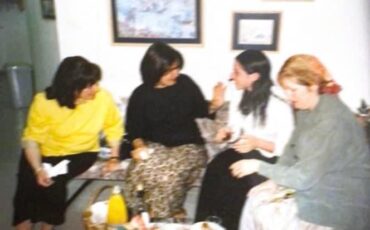It happens at every chuppah.
After the bride’s encircling of the groom seven times, after the recital of the special blessings, after the ring has been placed on her finger, there is a few seconds of collective silence in anticipation. Then there is the definite loud crunching of glass as shards are being broken underfoot, followed by the uproarious “mazal tov” issued in unison from everyone present.
The broken glass under the chuppah is meant to remind us of the destruction of the Holy Temple. Even in a moment of such blissful happiness at the unison of two souls in marriage, we remember that we are still in bitter exile.
Interestingly, though, the breaking of the glass has become the signal for everyone to call out the congratulatory, “mazal tov!” It’s almost as if it is the breaking glass that confirms the marriage, validates the joy, and endorses the momentousness of this wonderful new beginning.
Why has a moment that is meant to signify the sadness of the Temple’s destruction developed into such a congratulatory event, the signature moment, almost, of the marriage ceremony?
I was thinking about this, at the marriage of my eldest daughter. I thought that perhaps the deeper more conceptual message of the breaking of the glass is the reminder that being in exile means that our lives are not perfect. That we are not complete, but rather broken.
There is no person who is flawless. True, every bride standing beneath the chuppah believes (and should believe) that her groom is so perfect, so wonderful, so talented and so capable, so sensitive and caring. And he, too, surely feels the same about her–that he is marrying the ideal woman, faultless to the core, and that there is no one in the world as special, intelligent and caring as she.
The two of them together have also dreamed the perfect dream of how complete and perfect their life together with be. How much they will both accomplish, how they will each work side by side harmoniously, how meaningful and fulfilling it will all be.
But perhaps the breaking of the glass under the chuppah is there to remind both of them (and all of us) that every vision is a little bit flawed, that every dream has a hole in it, that every life has some cracks. That every person has imperfections, deficiencies, and areas of incompleteness.
Perhaps it is only when we are each prepared to acknowledge that we don’t need to be flawless for there to be a strong love for one another, that our life doesn’t have to be perfectly whole for it to be rich and meaningful–only then can each of us move forward, and only then can a bride and groom truly begin their new unified life together.
So under the chuppah, the bride and groom (and each of us present) will make that small symbolic “shattering” of perception of each other’s perfection, and accept one another wholly as s/he is, cracks, fissures and all. That moment of absolute acceptance will forge the everlasting bond between the new couple.
And, as for those of us present, only once we are each able to break the vision of our own lives and dreams as being so whole and perfect, are we ready to begin to repair our world, to pick up the broken pieces of our exile and to truly begin building a redeemed existence.
May it be with mazal!






